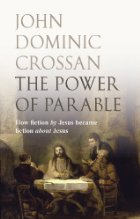 Crossan would never say the gospels are “only” parables about Jesus. He would say something like: “The gospels are parables about Jesus and that’s what makes them so shockingly subversive and provocatively challenging for us today. They humble our prejudicial absolutes. They remind us that Jesus can never be fully trapped by our human imagination. Parables about Jesus delicately provoke us into a stunning paradigm-shift by means of a participatory pedagogy and a collaborative eschaton.” (I have mixed and matched phrases from Crossan here to produce this hypothetical “quotation”.)
Crossan would never say the gospels are “only” parables about Jesus. He would say something like: “The gospels are parables about Jesus and that’s what makes them so shockingly subversive and provocatively challenging for us today. They humble our prejudicial absolutes. They remind us that Jesus can never be fully trapped by our human imagination. Parables about Jesus delicately provoke us into a stunning paradigm-shift by means of a participatory pedagogy and a collaborative eschaton.” (I have mixed and matched phrases from Crossan here to produce this hypothetical “quotation”.)
But he does say that they are parables about Jesus nonetheless.
This post is part two of a series on Crossan’s 2012 book, The Power of Parable. Part one is here; part three to come.)
The Gospels as Parables
Crossan writes for believers who love to listen to well-educated and sophisticated theologians preach sermons that are introduced with rambling stories and then turn to paradoxical and punning turns of phrase (“It is never just about food. It is always about just food.” “Even if ironic, [parables] are always irenic.”) that are served as spiritual wisdom. He uses imperatives to draw readers into following his line of thought: “Watch now as I turn to . . .” “Think about this . . .” “Look at those words. . . ” “Hear that story against. . .” “Wonder for a moment why . . .”. He strains on every page to make the Bible relevant to the modern Western reader, even if that means leading readers to think of the words and deeds of Jesus through modern ideals and concepts of educational philosophy. Crossan’s Jesus remains the unblemished paragon who lived out his (Crossan’s) highest ideals at all times — “Think, therefore, about this: Does Jesus change his mind or does Matthew change his Jesus?“ (p. 187). Jesus’ God is always Crossan’s nonviolent God who seeks collaborative working relationships with humanity at all times.
For Crossan, the gospels are a particular type of parable. They are “Challenge” parables. He means they challenge their hearers to think and act differently. That sounds to me like a preacher injecting modern meaning and relevance into texts for the benefit of his parishioners who are looking for a reason to keep valuing the Bible. So, even though this “Challenge” theme predominates Crossan’s discussion, I will not make it the heart of my summary and will try to focus on his argument that the Gospels are themselves parables — although part of the reason Crossan sees them as parables is bound up in his interest in the theme of “challenge”.
